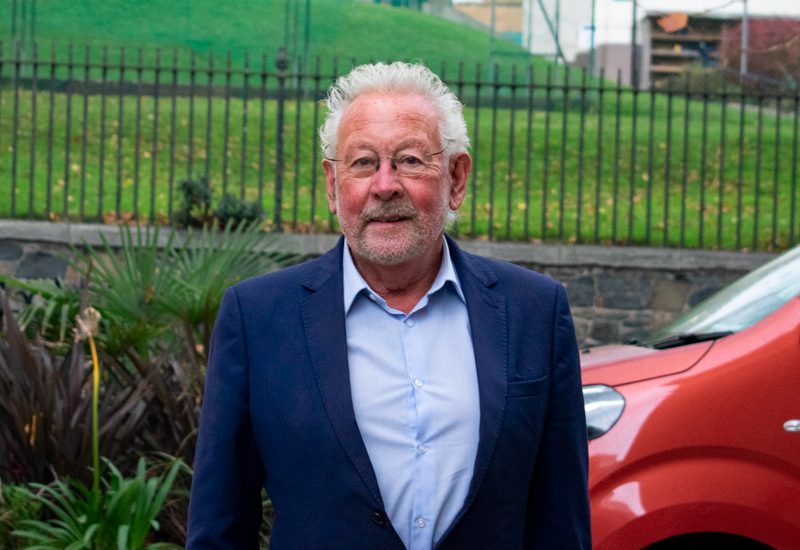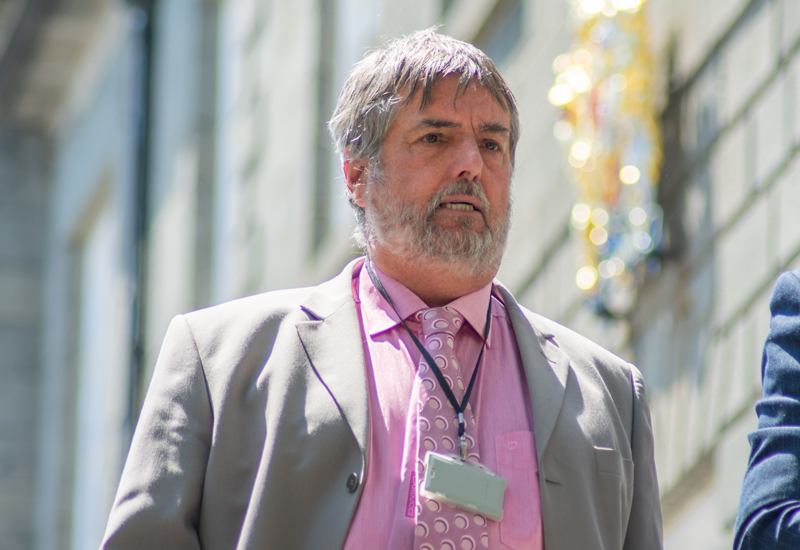


The States’ senior committee – Policy & Resources – has consistently tried to keep end of life care, and in particular assisted dying, off the political agenda for this States’ term.
But gradually, step by step, there is a sense of inevitability that the Assembly elected in 2020 will have to revisit these complex, divisive and profoundly important issues before their term ends three-and-a-half years from now.
The States last debated them – and heavily defeated proposals for reform, by 24 votes to 14 – as recently as 2018.
The President of the Policy & Resources Committee, Deputy Peter Ferbrache, has referred to that attempt to introduce assisted dying as a “vanity project” led by his predecessor, Deputy Gavin St. Pier. Also in that debate of 2018, Deputy Heidi Soulsby, now Deputy Ferbrache’s Vice President at Policy & Resources, first backed an amendment to dilute the original proposal to agree to legalise assisted dying and then, when the amendment was successful, voted against the amended proposals anyway.
This year, Policy & Resources proposed de-prioritising a review of end of life care and adding it to a list of projects considered desirable by the States but provided with no funding and no completion date. When this was challenged by a counter-proposal to prioritise and fund a review of end of life care, all five members of Policy & Resources voted against. But the States’ Assembly disagreed with them and forced the issue of end of life care back into a list – albeit a long list – of work to be undertaken before 2025. This was the first indication of this Assembly’s willingness to re-examine what is unarguably one of the most challenging political and moral issues.

Pictured: Earlier this year, the Policy & Resources Committee was unanimous in asking the States not to require any review of end of life care or assisted dying to be prioritised in this States' term, but the Assembly backed an amendment which forced the issue up the political agenda.
Yesterday, in an historic decision, the first of its kind for a government in the British Isles, the States’ Assembly in Jersey approved – in principle – changing the law to permit people to choose when to die if they have a terminal illness or an incurable condition causing unbearable suffering. This was five months after a consultative citizens’ jury voted by a majority of nearly 80% to recommend that Jersey should allow assisted dying. Detailed legislation will now be drafted over the next 12 months. Albeit this is sure to be an election issue when Jersey goes to the polls in June.
Timely in view of today’s historic compassionate decision in Jersey to improve terminally ill individuals’ end of life options.
— Gavin St Pier ???????? (@gavinstpier) November 25, 2021
The world has come along way since that case in 1971 and indeed the Netherlands’ legislation in 2001. https://t.co/g0UXX7zOsL
Pictured: In the last States' term, Deputy Gavin St. Pier led unsuccessful proposals to legalise assisted dying.
In other developments, an assisted dying bill is progressing through the House of Lords, a public consultation is underway in Scotland and a special committee on the issue will start work in Ireland in the New Year.
In September, the British Medical Association – sometimes referred to as the doctors’ union – dropped its long-standing opposition to assisted dying and adopted instead a neutral stance, including in relation to physician-assisted dying.
Locally, in a survey of public opinion, Island Global Research found that 69% of respondents strongly supported assisted dying.
Pictured: Earlier this year, a survey of public opinion indicated that around two-thirds of people in all three Crown Dependencies - Guernsey, Jersey and the Isle of Man - are in support of legalising assisted dying.
Several deputies who spoke to Express after yesterday’s vote in the States’ Assembly in Jersey hoped it would soon encourage another debate in Guernsey about end of life care and assisted dying. This included some who were not members of the States last time the issues were debated and who are generally viewed as in the ‘middle ground’ of the Assembly unaligned to either of the two largest voting blocs apparent on most substantial votes.
Deputy Adrian Gabriel said that Jersey had made “a good decision based on useful input from the citizens’ assembly”.
He said he hoped that assisted dying would be debated during the current States’ term and that it would be “useful to investigate creating a citizens’ assembly here”.
“In principle, I’d support legalising assisted dying. We’ve just approved changes to the abortion law, giving women choice over what to do with their foetus, and that choice should extend to the woman and to everyone with adult, decision-making ability.”
Deputy Gabriel said he could envisage voting to legalise assisted dying in this States’ term if the Assembly was presented with “a well-crafted policy letter giving consideration to residents – but not ‘death tourists’ – and healthcare professionals to carry out termination of life with built-in cooling off periods too”.

Pictured: Deputy Adrian Gabriel was pleased that the States' Assembly in Jersey voted in favour of assisted dying in principle and hopes that the States of Guernsey may soon revisit the issue.
Deputy Andy Cameron – like Deputy Gabriel, a first-time candidate at last year’s general election – said he was quite surprised by the vote in Jersey’s States’ Assembly but described the decision as “very forward thinking”.
“Yes, I think it should be investigated again in Guernsey,” said Deputy Cameron. “I’m sure that Jersey would allow us access to much of their useful and up to date research. I would welcome a debate on assisted dying in our States this term.”
Deputy Cameron was also sympathetic to setting up a citizens’ jury or citizens’ assembly to obtain a cross-section and possibly a representative sample of public opinion on assisted dying.
“Assisted dying is a highly emotive topic and I think it would be beneficial to set up a citizens’ assembly,” he said. “I know there are strong, opposing views which need to be highlighted and shared. I would hate to see this debate influenced only by those who shout the loudest as so often happens with contentious issues in Guernsey.
“Palliative and end of life care go some way towards addressing the need to introduce assisted dying. Palliative care also addresses symptoms beyond physical pain, in ways that go beyond medication. Patients facing serious illness may feel hopeless and depressed, as though their lives have lost meaning. Addressing psychological, emotional and spiritual problems is essential to palliative care.
“Assisted dying alleviates none of these problems but gives in to them. That said, I think there are circumstances where it helps people out of unavoidable suffering. With responsible monitoring, it definitely has its place. I would be in favour of legalising assisted dying.”

Pictured: Deputy Andy Cameron supports legalising assisted dying and thinks it would be a good idea to set up a citizens' jury or citizens' assembly to allow all shades of public opinion to be heard, understood and respected.
Alderney Representative Steve Roberts was also not a member of the States when assisted dying was last debated in 2018 but he seconded the successful amendment to add the issue back into the States’ list of priorities for the current term.
“I am quite strongly of the view that the choice of a very sick individual who is suffering should rest with that individual,” said Mr Roberts.
“I agree with the position taken by the States in Jersey. I feel that when the issue comes back to us, it may well succeed in our own Bailiwick.”

Pictured: Alderney Representative Steve Roberts seconded an amendment to move investigations into assisted dying up the political agenda in this States' term.
Unsurprisingly, the only two remaining deputies who have previously led proposals in the States to legalise assisted dying – Gavin St. Pier and Peter Roffey – remain firmly in favour of the reform.
“I am absolutely delighted that Jersey’s States Assembly has supported improving terminally ill individuals’ end of life choices – and has done so with a substantial majority that pretty much mirrors public opinion,” said Deputy St. Pier.
“I thank Jersey’s politicians for being bold enough to follow the evidence and listen to their community. Introducing a regulated regime to allow individuals to make a personal choice will actually improve safeguards for the most vulnerable in the community. By being the first jurisdiction in the British Isles to approve such a change, Jersey has proven that size is no bar.
“I have always been convinced that this option is an absolutely inevitable development that a clear majority of the community want for themselves and their loved ones. Even if in practice very few people will ever choose to exercise such a choice, most people don’t want others telling them what they can or cannot do for themselves and are comforted knowing this is an option they may be able to access one day, if they ever need and wish to.
“I am certain that this States will need to engage with this issue one way or another. The public see no vanity in suffering and pressure will build as others around us – Jersey, Scotland, Ireland – all move ahead to more compassionate, better-safeguarded regimes than we currently have.
“Wherever and whenever the public get a chance to express a view – whether it’s through Jersey’s citizens’ assembly or New Zealand’s referendum - the result is the same: overwhelming public support. Guernsey will be no different.”

Pictured: Deputy Gavin St. Pier (left) and Deputy Lyndon Trott (right) were President and Vice-President of the Policy & Resources Committee when, in 2018, they backed proposals to legalise assisted dying. Their successors on the Committee have consistently argued that assisted dying should not be high on the agenda of the current States.
At this stage, Deputy St. Pier is making no commitment to lead proposals for change having done so unsuccessfully relatively recently, though it is difficult to imagine him leaving the issue to drift if other States’ members choose not to lead it themselves.
Deputy Roffey, unlike Deputy St. Pier, has been more than adequately employed by the States in committee work. He is President of two major committees – Employment & Social Security and the States’ Trading Supervisory Board. He could be forgiven for hoping that others with more time available will lead the charge to legalise assisted dying. His conviction remains strong that it is the right thing to do.
“I am fascinated and delighted to see that one of the Channel Islands has become the first jurisdiction in the British Isles to decide – albeit in principle – to legalise assisted dying,” said Deputy Roffey.

Pictured: Deputy Peter Roffey bears the scars of debates about assisted dying over many years, having backed proposals to reform the law when he was President of the Board of Health nearly 20 years ago.
“I think it was both a courageous and caring vote by the States of Jersey. Their decision respects their citizens’ personal autonomy and allows them to avoid living through the final weeks of their lives if they find that process intolerable.
“I believe Guernsey’s current denial of that choice is cruel. But I am not mindful to ask the States of Guernsey to re-debate the issue anytime soon unless newer members give a very clear indication that they would wish to.
“It is only a relatively short time since the States decided to reject the idea of assisted dying by a sizable majority. I was bitterly disappointed with that outcome, but I am a democrat and respect the outcome. However, there has been a general election since, and if a significant number of newer members support the concept and wish to take it forward then they will certainly have my support.”
Whether assisted dying is backed by the States this term may well come down to how strongly deputies in their first term feel about it. Among the 38 deputies – or currently 37, with one suspended – there are seven who expressly and consistently voted to legalise assisted dying last term and 10 who opposed such a move. One other had to be absent when the substantive votes were taken in 2018 but is thought to be broadly supportive of reforming the law.
Deputy St. Pier thinks reform is only a matter of time. “Guernsey’s day will come – and Jersey’s decision today puts that day a step closer,” he said.
In a future edition of FOCUS, Express will put the spotlight on the other side of the argument about assisted dying and speak to deputies and others who see no need for the States to revisit the issue in the near future or at least hope this Assembly will not vote to legalise assisted dying.
Comments
Comments on this story express the views of the commentator only, not Bailiwick Publishing. We are unable to guarantee the accuracy of any of those comments.